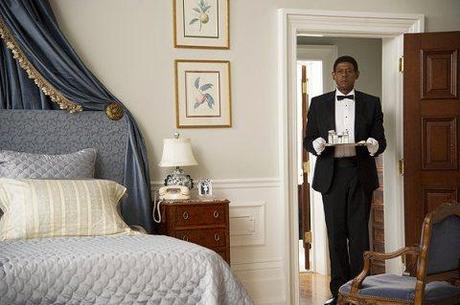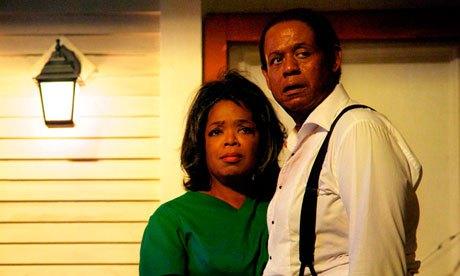
by Steve Habrat
It isn’t uncommon for one or two Oscar hopefuls to sneak into movie theaters near the end of the summer, when the aliens have been battled back into space and the superheroes have hung up their capes until next May. It really is a nice change of pace considering that blockbuster fatigue does begin set in by early August. Recently, hype has been slowly building around Woody Allen’s new film Blue Jasmine, but for weeks now there has been plenty of talk about director Lee Daniels’ star-studded new picture The Butler, a film that is bound and determined to get some sort of recognition from the Academy of Motion Picture Arts and Sciences. The Butler is certainly an absorbing drama that digs deeply into a wound on American history, a wound that still hasn’t quite healed up. Based upon the life of Eugene Allen, Daniels latest effort is bursting at the seams with performances from a roster of Hollywood who’s who, and one that is carried off into the clouds by the always-fantastic Forest Whitaker, who should probably start ordering a tux right now for Hollywood’s big night. While there is plenty of family melodrama and quiet personal anguish that pierces the heart, Daniels may have missed a shot at the Best Picture and Best Director category due to a few bungled sequences that resemble something you might see on a made-for-TV movie, not something you’d see in an Oscar hopeful.
The Butler begins in 1926, with a young Cecil Gaines witnessing his father (played by David Banner) being gunned down after speaking up about the harassment that his wife (played by Mariah Carey) has been enduring at the hands of the vile cotton plantation owner. The young Cecil, who has been learning how to work the cotton fields, is soon pulled from under the hot Georgia sun brought into the plantation household to learn how to act as a house servant. A few years later, Cecil (played by Forest Whitaker) leaves the plantation and ends up landing a job as a butler at the Hotel Excelsior in Washington D.C. After charming a handful of Washington bigwigs, Cecil is contacted by the White House about a job as a butler for the Eisenhower administration. Cecil accepts and quickly becomes a favorite among the White House staff as he silently observers multiple presidents—Dwight D. Eisenhower (played by Robin Williams), John F. Kennedy (played by James Mardsen), Lyndon B. Johnson (played by Liev Schreiber), Richard Nixon (played by John Cusask), and Ronald Reagan (played by Alan Rickman)—and the difficult decisions they are tasked with making. Meanwhile, Cecil’s home life begins to suffer as his wife, Gloria (played by Oprah Winfrey), develops a drinking problem and falls into the arms of another man (played by Terrence Howard), his oldest son, Louis (played by David Oyelowo), gets swept up by the Civil Rights Movement, and his youngest son, Charlie (played by Elijah Kelley), gets shipped off to Vietnam.
With so much history to cover, you fear that The Butler’s two hour and ten minute run time may not be quite enough to do it all justice, but Daniels handles a majority of it with ease. Sadly, there are a few years that are reduced to a quick-cut montage of fuzzy stock footage. Some of the more violent stretches are sanitized for a PG-13 audience but there are still a handful of images that manage to haunt (a pair of black men hanging battered and bloodied are a grim warning and the riots in the aftermath of Martin Luther King Jr.’s assassination are appropriately angry and raw). One of the most powerful stretches of The Butler is a sequence that finds Cecil preparing a ritzy White House dinner while his son and a handful of his friends march proudly into a diner and request service in the non-colored section. The sequence is superbly edited together and it effectively builds tension in the way it closes itself around the viewer, backing us into a corner as white-hot hate crashes all around. This particular sequence doesn’t mince words but there are a number of scenes that seem defanged. One of the softer moments comes when Cecil’s son Louis is bopping along happily on a bus with his Freedom Rider friends when their bus is suddenly cornered by an enraged group of KKK members. Rather than allowing the action to play out at normal speed, Daniels makes the perplexing decision to bring the violent encounter to a slow-motion halt in an awkward attempt to really underline the fact that these hate-spewing monsters are the very definition of evil. This moment, which should have you holding your breath, comes off like something you’d see in a History Channel documentary rather than a Hollywood movie. I suspect that at normal speed, this scene would have had both black and white viewers covering their mouths in horror.

Carefully worked into this historical tour is a melodramatic portrait of a family that is on the verge of coming apart. Cecil is forced to quietly keep his composure as he brings tea right into the Oval Office and face individuals who are fully capable of doing something about the racial tensions ripping America to shreds. Watching Whitaker tackle this role is never short of amazing and the way he allows us to glimpse his heavy heart through his sad eyes is really something special. He’s a frustrated father, an absent husband, and warm face that greets school children with a plate of cookies as they arrive at the White House for a field trip tour. Winfrey, meanwhile, is a huge surprise as Cecil’s bored housewife, who turns to the bottle and another man to fill the empty gap in her life. Winfrey is absolutely on fire in a sequence in which she berates a fatigued Cecil as he tries to get some sleep. Then there is Oyelowo’s Louis, Cecil’s pissed off son who is sickened by the way his people are being treated. He starts out with small protests that earn him a night or two in jail (as well as a pot of hot coffee thrown in his face) only to graduate into the Black Panthers with a grimacing galpal that tells the conflicted young man that she is willing to kill for her people, a statement that forces Louis to look inward and find an alternative way to help African Americans earn equal rights. He’s equally as strong as Whitaker every step of the way.
As far as the rest of the all-star cast goes, they’re somewhat of a mixed bag. Williams is as good as ever in his few scenes as Eisenhower, Mardsen is grossly miscast as the charismatic Kennedy, Schreiber is a ball of energy as Johnson, Cusack is slouched defeat as Nixon, and Rickman is a stone-cold and unbending Reagan. Jane Fonda turns up in a brief appearance as Nancy Reagan, who invites the popular Cecil to a White House dinner that he’d normally be serving. Cuba Gooding Jr. and Lenny Kravitz offer up strong supporting roles as two other butlers at the White House who become chummy with lovable old Cecil. David Banner’s small but affectionate role as Cecil’s father is impressive and Carrey is completely wasted (and barely recognizable) as Cecil’s abused mother. Nelsan Ellis appears in a small role as Martin Luther King Jr., but his presence doesn’t seem to pack the wise wisdom that it so desperately wants. Daniels should have left him to the stock footage that he liberally uses as the film’s guiding track. Overall, The Butler is certainly a handsome film (don’t forget to take in the meticulous sets and period clothing) and one that sets out to encourage every single viewer—whether they are white, black, young, or old—to reflect on the topic of race in America. It certainly does spark a bit of reflection on the issue, but the film is just a bit too innocuous to really shake things up like it wants. However, The Butler is still an entertaining film that features a powerhouse performance from Whitaker.
Grade: B+
